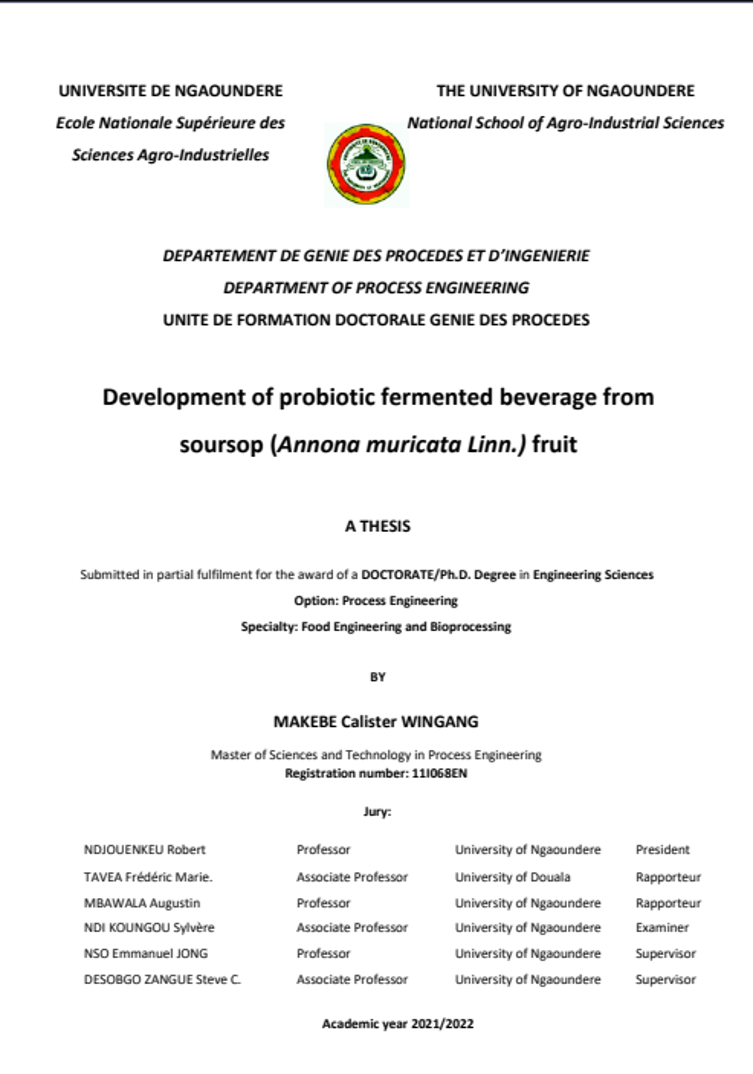Development of probiotic fermented beverage from soursop (Annona muricata Linn.) fruit (2022)

Soursop (Annona muricata L.) is a fruit from the tropical and subtropical regions of the world with good nutritional and therapeutic benefits. In spite of its enormous potential, this fruit, like many others in the tropics and subtropics, suffers enormous post-harvest losses. The current study aimed at prolonging the shelf-life of its pulp by the production of a probiotic beverage, using Lactobacillus strains. Development of probiotic beverage involved the application of Doehlert design to optimise pectinase assisted-extraction of the juice from fruit pulp; the modelling of fermentation process of extracted juice; and the assessment of probiotic beverage shelf-life. For the optimisation of pectinase assisted-extraction, 3 factors including incubation time (30–180 min) and temperature (35-55 ℃), and enzyme concentration (0.01–0.1%, w/w) that can potentially influence juice yield, were assessed. At the optimum condition: an incubation time and temperature of 172 min and 42.2 °C respectively, and enzyme concentration of 0.04% (w/w), the results obtained showed extraction yield (75.20%), pH (3.74), clarity (87.06%T), TSS (7.35 °Brix), and titratable acidity (0.44% MAE). Rheological measurements demonstrated a drop in viscosity of the hydrolysed juice compared to the unhydrolysed juice and the A. muricata pulp. The pectinase-extracted juice was subsequently batch-fermented for 72 h at 37 °C using Lactobacillus acidophilus (LA) and Lactobacillus casei (LC) first independently, and then their consortium (Lactobacillus acidophilus and Lactobacillus casei, LCA). The biomass concentration, reducing sugar and lactic acid content were monitored throughout the fermentation process followed by the fitting of fermentation experimental data into the Monod, Luedeking and Piret and logistic models. The LCA obtained the highest maximum cell growth of 11.5 (log CFU/mL) after 36 h; followed by LA with 10.1 (log CFU/mL) after 36 h and 9.1 (log CFU/mL) for LC after 24 h. Furthermore, best fitting to the fermentation kinetic models was obtained with maximum specific growth rate of 0.28, 0.17 and 0.15 (h-1) and saturation constant of 9.06, 9.93 and 9.07 (g/L) for LC, LA and LCA, respectively. The experimental data for LC, LA and LCA had best fitting with the logistic model for growth kinetics with maximum specific growth rate of 0.40, 0.22 and 0.16 (h-1) and maximum biomass of 8.89, 8.92 and 9.93 (log CFU/mL) for LC, LCA and LA, respectively. The functional characteristics obtained showed that the microorganisms used in this study were able to survive passage through the gastrointestinal tract. The study of shelf-life of A. muricata probiotic juice at 4 °C for 28 days revealed that all three samples were microbiologically stable with a prebiotic load greater than 8.8 log CFU/mL which is greater than the stipulated minimum for probiotic products (6 log CFU/mL). In the light of the above results, A. muricata could be a suitable feedstock for the production of probiotic juice using LA and LCA.
Le corossol (Annona muricata L.) est un fruit des régions tropicales et subtropicales du globe avec de bienfaits nutritionnels et thérapeutiques. Malgré son énorme potentiel, ce fruit, comme beaucoup d'autres des régions tropicales et subtropicales, est sujet a d'énormes pertes post- récoltes. L'étude actuelle visait à prolonger la durée de conservation de sa pulpe par la production d'une boisson probiotique, en utilisant des souches de Lactobacillus. Le développement d'une boisson probiotique a impliqué l'application du plan de Doehlert pour optimiser l'extraction assistée par la pectinase du jus de la pulpe de fruit; la modélisation du procédé de fermentation du jus extrait; et l'évaluation de la durée de conservation des boissons probiotiques. Pour l'optimisation de l'extraction assistée par la pectinase, 3 facteurs, dont le temps d'incubation (30-180 min) et la température (35-55 ℃), et la concentration en enzymes (0,01-0,1%, w/w), qui peuvent potentiellement influencer le rendement en jus, ont été évalués. Dans les conditions optimales: un temps d'incubation et une température de 172 min et 42,2 °C respectivement, et une concentration en enzyme de 0,04 % (p/p), les résultats obtenus ont montré un rendement d'extraction (75,20 %), un pH (3,74), une clarte (87,06 % T), TSS (7,35° Brix) et acidité titrable (0,44 % MAE). Le jus extrait à la pectinase a été ensuite fermenté en batch pendant 72 h à 37 ° C en utilisant Lactobacillus acidophilus (LA) et Lactobacillus casei (LC) d'abord individuellement, ensuite avec leur mélange (Lactobacillus acidophilus et Lactobacillus casei, LCA). La concentration de la biomasse, la teneur en sucres réducteurs et en acide lactique ont été suivies tout au long du procédé de fermentation, suivies de l'ajustement des données expérimentales de fermentation dans les modèles Monod, Luedeking et Piret et logistiques. Le mélange LCA a obtenu la croissance cellulaire maximale la plus élevée de 11,5 (log CFU/mL) après 36 h; suivi par LA avec 10,1 (log CFU/mL) après 36 h et 9,1 (log CFU/mL) pour LC après 24 h. De plus, le meilleur ajustement aux modèles de cinétique de fermentation a été obtenu avec un taux de croissance spécifique maximal de 0,28, 0,17 et 0,15 (h-1) et une constante de saturation de 9,06, 9,93 et 9,07 (g/L) pour LC, LA et LCA, respectivement. Les données expérimentales pour LC, LA et LCA correspondaient le mieux au modèle logistique pour la cinétique de croissance avec un taux de croissance spécifique maximal de 0,40, 0,22 et 0,16 (h-1) et une biomasse maximale de 8,89, 8,92 et 9,93 (log CFU/mL) pour LC, LCA et LA, respectivement. Les caractéristiques fonctionnelles obtenues ont montré que les microorganismes utilisés dans cette étude étaient capables de survivre au passage au tractus gastro-intestinal. L'étude de la durée de conservation du jus de corossol probiotique à 4 °C pendant 28 jours a révélé que les trois échantillons étaient microbiologiquement stables avec une charge prébiotique supérieure à 8,8 log CFU/mL, ce qui est supérieur au minimum requis pour les produits probiotiques (6 log CFU /mL). A la lumière des résultats obtenus, A. muricata est une matière première appropriée pour la production de jus probiotique utilisant LA et LCA.


